Summary
- We need more third spaces like the OCF.
- Running servers is hard; teaching people how to run them is exponentially harder.
- If you’re a current Berkeley student looking for a club to join, consider joining the OCF!
Request for Comment
This post is in need of your feedback! Please send me any thoughts you have; it would make my day :)
If you reside in the Bay Area and want to chat about this topic irl, I’m happy to buy you a coffee and/or meal in exchange for your insight (or anything else you’d like to talk about)!
My college years were pretty wild. I completed 3 majors (computer science / data science / psychology), taught a collective 7 semesters as a TA, and survived several natural disasters including a literal pandemic!1
1 During my time at Berkeley, I encountered assaults from water (dorm flooding), air (covid), and fire (the ‘19 norcal wildfires). if an earthquake struck maybe the four nations would have lived in harmony (?)
Throughout all of the craziness, I considered the OCF my second home. Many of the memories, friendships, and learnings I carry from college today materialized within its walls.
I’ve really enjoyed discussing the topics in this post with OCF staffers in bits and pieces over the years, and I’d like to release it all to a wider audience in one place. My motivation for doing so comes in two parts:
- I’d like current students at UC Berkeley to know what the OCF is, and understand whether it’s a good fit for them!
- I’ve realized that my experiences contributing to the OCF could be helpful to those of you who are trying to find, build, or nurture close communities during and after college.
I. what is the open computing facility?
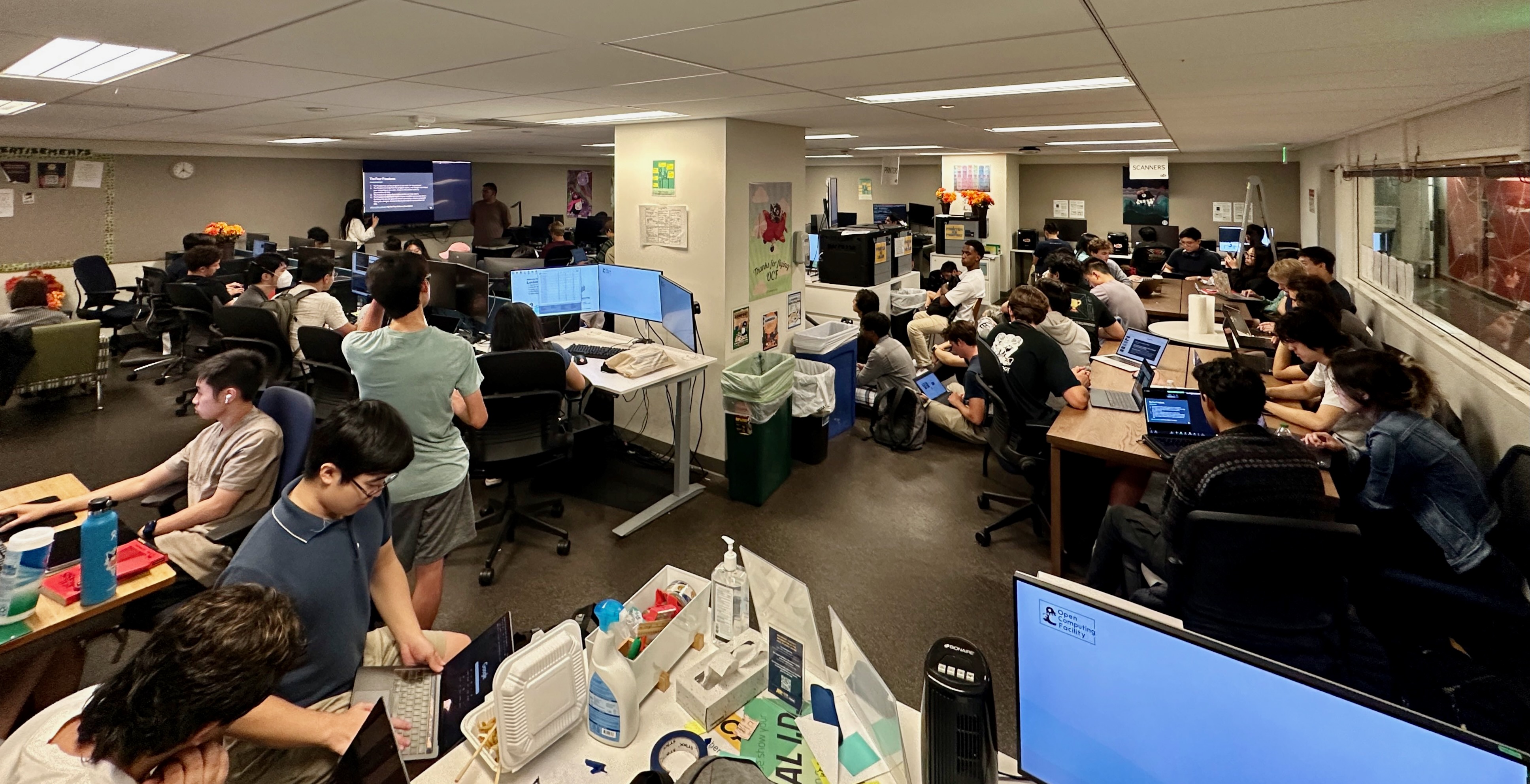 The OCF is, to any given person, one or more of the following:
The OCF is, to any given person, one or more of the following:
- a social club
- a physical space
- a classroom
- a service provider for the open source community
- one of the most well-funded and influential student orgs at Berkeley
Behind the scenes, ~30 student volunteers care for the lab space and maintain the services it offers. We also hire 6-ish Operations Staff (“opstaff” for short), who work paid shifts at the front desk during the 57 hours a week we’re open to the community.
Apart from being an IRL place you can visit for free printing, the OCF also has a deeply technical side to it.
- We design, purchase, and maintain some crazy powerful on-premise server infrastructure in a small (and very loud) room adjacent to the main lab.
- We host almost all of UC Berkeley’s 1,000+ student org websites and many of its academic lab websites.
- We’re one of the biggest mirrors of open source software on the west coast. If you live in/near California and installed Blender/GIMP/a Linux distribution recently, there’s a good chance they came from the OCF’s servers!
aside: The History Box
although very tangential to the main topics in this post, the OCF has a super cool history that’s worth shouting out!
For much of its 35-year existence, the OCF has served as the user-facing front for the ongoing shenanigans of its sister organization, the eXperimental Computing Facility (XCF). Some legendary names and projects in computer science you might recognize from the XCF’s lore include:
- GTK, the graphics toolkit used by Ubuntu
- Phil Lapsley, slayer of the Morris worm
- Pei-Yuan Wei, creator of the first graphical web browser
- Spencer Kimball and Peter Mattis, creators of GIMP, the world’s most popular open-source image editor3, and co-founders of CockroachDB
2 GIMP’s file extension is, to this day, .xcf as a reference to its birthplace.
In addition to this, the OCF/XCF have co-hosted Berkeley’s Linux Sysadmin DeCal course since 2001. When I was a facilitator, I’d joke that the class I’m teaching is older than myself!
It’s fun to peruse the old meeting minutes and see what the club was thinking/doing in the previous decades:3
3 another fun historical quirk: the OCF shared our storage room with Blue and Gold (the yearbook club) while I was there. We’d often walk past yearbooks that dated back to the 1800s!
Quote
Mike is a doofus and demonstrated this by splattering Coke all over the minutes and the minute taker as they were being taken.
—April 17, 1990-
Quote
Enzyme cluster, dig dis: It be now definite dat we gots’ta not git de enzyme clusta’ if we do not manage t’arrange it drough some SUN representative. What it is, Mama! gwh, dig dis: “So I’ll gots’ta contact da damn campus SUN rep. t’unsolicit(cp) some donashun …” welch, dig dis: “Do ya’ know de dojigger uh de campus SUN rep?” gwh, dig dis: “No” welch, dig dis: “Good”
—September 26, 1991 (am i too zoomer to understand the entirety of fall 1991??? somebody pls help me lol)
II. putting the “O” in OCF: open membership as a double-edged sword
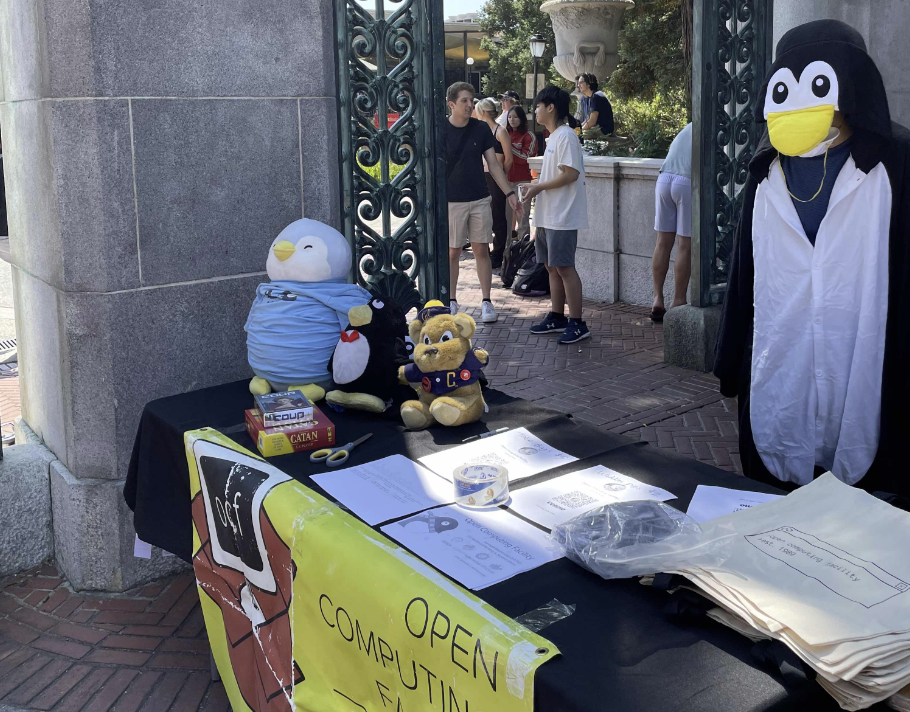 we REALLY need a new banner lol
we REALLY need a new banner lol
My first encounter with the Open Computing Facility was during freshman orientation, when I bumped into a guy wearing a penguin costume in Sproul Plaza. (something like the 2023 reenactment above, minus the awesome table/merch we got later!)
Being a socially inept freshman, I awkwardly asked him the obvious question.
Me: hey, why are you wearing a penguin costume?
Penguin: uh, I found it in the storage room and thought it was neat?
Me: what storage room?
Penguin: …
Me: …
Penguin: follow me, we have candy in the van a cool computer lab over that way!
So I did, and in the next hour I learned a great deal about Linux, and servers, and why there was a penguin costume in the storage room.4 The staff hanging out there were kind enough to help me sign up for their Linux class, which I was very excited about!5
4 Somehow, the old penguin costume disappeared over covid. We spent hours looking for it and it’s really gone :(( and with it, so shall its stories fade into the afterlife…
5 I later learned that the course had a waitlist of over 400 for 60 seats that semester. If you really want something from someone, just listen to them grumble about Ceph for an hour I guess?
After coming back a few times (and eventually every week to attend the Linux class once it started), I was officially/unofficially considered the OCF’s newest staff member!
For the uninitiated, Berkeley student clubs (especially professional and technology-oriented ones) are notoriously gatekeepy. Many of the popular ones come with grueling interview processes, sub-20% acceptance rates, and as a result, a big serving of prestige and exclusivity.
Joining OCF staff is nearly the complete opposite. There are only two steps required to become an official staff member:
- Show up.
- Keep showing up. (for reals! our constitution mandates it.)
From an ideological standpoint, this is fantastic in so many ways! I strongly believe that communities should be inclusive, transparent, and welcoming whenever possible.
In reality though, there are a bunch of reasons why nearly every club at Berkeley has an application process, including the following:
- Berkeley students respond positively to manufactured prestige: a large chunk of the student population, having been top performers for their entire lives and having been accepted to the greatest public university in the world, are hard-wired to look for opportunities to stand out. The OCF, having zero entry requirements, is incredibly un-prestigious in this regard.
- Vibe checks are cheaper than onboarding: It’s far easier to organize a group of people you’ve personally vetted to be active, enthusiastic, and a good fit for the club’s existing culture. At the OCF, we’re often unsure about the vibes and commitment levels of new staff— this leads to us investing a lot of time onboarding people who never come back, and (at worst) needing to remove problematic staff members.
- Overwhelming demand: Many technical orgs only have so much capacity to train and house new contributors; when there’s 200 hungry inexperienced freshman vying for 1 spot, you can’t just let everyone in.
The OCF, given its pretty niche place in the campus community, has always had a manageable amount of interest; we haven’t strictly needed a staff application for the reasons above. If anything, we’d probably have a greater amount of induced demand if we had a competitive application cycle!7
7 We’ve experimented with having an application process on multiple occasions (in which everyone gets in at the end)
- Optional coffee chats, when done well, are a good way of giving new staff one-on-one attention, and figuring out what aspects of the club people are interested in.
- Having a family system (where new staff get randomly assigned to one of several mentorship/social groups led by veteran staff) wasn’t all that effective. I think this was because it often felt like an additional obligation; since not everyone wants to join the OCF for its social aspect, getting everyone together for game nights or Chipotle runs created a considerable amount of friction.
- This isn’t exclusive to the OCF! Several other clubs I was a part of had well-organized family systems; I also found they struggled to make interactions feel organic and nurture long-lasting relationships.
Given these considerations, I think the biggest challenge in OCF-like communities with open membership is retention. Multiple times a week, someone new shows up at our doors asking about joining the OCF as a staff member; very few of them stay longer than a month. Since there’s no friction to join, there’s also no friction to leave (unlike surviving an application process, in which you feel obligated to see through your initial efforts).
There’s a very obvious solution at hand, but it’s difficult to implement at scale: make new people feel extra welcome and cared for! Oftentimes this is as straightforward as initiating a conversation with them when you see then stand awkwardly in a corner, unsure of how to insert themselves into pre-existing friend groups tossing inside jokes at each other.
I, alongside most others at the OCF, started off as that person standing awkwardly in the corner. Most of us felt the urge to leave, but we were rescued by someone who noticed and gave us a way in.
A note to veteran staffers: I know you’re all busy, and that most of you are introverts and talking to new people is incredibly scary. (I also identify as both.) But this is by far the easiest way to give back to the community that has given us so much, and to pay it forward to the next generation. I hope you’ll consider doing your part :)
III. tumbling down steep learning curves: the SM chronicles
Theory is when you know everything but nothing works. Practice is when everything works but no one knows why. At the OCF, theory and practice are combined: nothing works and no one knows why.
- a piece of paper taped to a pillar in the lab
At most tech companies, running on-premise servers to host 1000+ websites, 30,000+ users, 100s of terabytes of user data, and a high-performance GPU cluster would be handled by an all-star team of 5-10 seasoned engineers. At the OCF, this work is mostly done by 2 unpaid volunteer college students known as the Site Managers (SM’s).
(To be clear, I was not an SM. I may have the skills/experience to be one now, but I certainly didn’t when I was in college!!)
On top of all this, the SM’s have to train new staff, often with zero prior experience, in hopes that they’ll one day leave the OCF in good hands when they graduate.
If this sounds like an impossible task, maybe it is— I (alongside most of the other veteran staffers I worked with) spent our years trying to design a smooth onboarding experience, to no avail. Our strategy to this day remains the same as it’s always been: pray some legendary genius shows up in the nick of time and saves the day before our servers collapse under their own weight.
This strategy has, miraculously, worked for 35 years! The former/current SM coalitions consist of the most talented people I’ve ever met. But it’s scary that there’s no backup plan; it’s entirely possible our generation will be the last, because Berkeley recently made some changes to admissions that suggest the number of new computer science majors is now ~half of what it used to be.
While I worked on this problem, most of my experimentation surrounded this three-part hypothesis:
- Many Berkeley students excel at learning in structured classroom environments, and struggle at “make a bunch of computers do XYZ thing”-type tasks with minimal guidance. (At no fault of anyone- this is the kind of thinking most professional engineers develop years into their career!).
- Contributing to actual OCF infrastructure necessitates real-world experience, but even the most trivially useful infra projects are too complex for beginners to grasp.
- An effective onboarding solution must involve creating low-maintenance, reproducible, high-feedback toy environments to bridge the gap between theory and practice.
Our Linux course is well-equipped to handle the gentle classroom-environment introduction within a semester. Course feedback indicates most students come out of it feeling comfortable using Linux and thinking about basic systems- but they feel like contributing to the OCF is still far out of reach.
As a stopgap solution, I wrote up a few staff training documents that are specifically geared towards course students who want to join technical staff. For those who follow it, these guides force you to get your hands dirty and actually touch the OCF’s internals (albeit in a harmless manner). But this is still far from enough.
The current course facilitators (shoutout to laksith especially!) are continuing down this path of experimentation. Since I was there, they’ve cooked up:
- dedicated virtual machines that we give to all students and new staff to have a safe place to play
- a new experimental track of the Linux course centered around the ‘do it yourself and break things’ approach to learning
Some other things I believe we need: better mentorship, better documentation, and a more curated/up-to-date list of useful starter projects.
I’m excited to see future iterations as we get closer to cracking the code for the ultimate systems engineering classroom!
IV. fostering a culture of reluctant leadership
Throughout its 35-year history, OCF’s leadership and technical contributors have received a grand total of $0 in monetary compensation for their work.
There’s a lot of nuance in how the OCF operates as a volunteer organization, much of which stands in stark contrast to industry and university practices:
- SM’s and technical staff are doing same type/amount of work they do for the OCF as a senior engineer making mid-six figures;
- General Managers (GMs) and administrative staff are doing the same work and talking to the same people as upper management of most other campus facilities (like the Student Union and the libraries);
- We pay our opstaff for similar scopes of work; oftentimes, Operations Managers and General Managers are in the same meetings and working the same deals.
Campus officials have repeatedly offered to provide us stipends, and we have repeatedly rejected them.
This begs the question (that most fully volunteer positions probably get, too): if we’re so obviously generating value, why are we undervaluing our work?
I’ve heard a multitude of arguments, any of which aren’t particularly convincing on their own but do help to paint a clearer story:
- Historically, OCF alums are very highly sought-after by tech companies willing to pay us far more than enough to make up for it. We don’t actually need the money.
- The OCF is a staunch ally of the wider open-source software community, which encourages making and publishing technical contributions without cost or restriction to its users (“free as in freedom”).
- If OCF leadership positions were to become paid, the entire organization’s identity would be thrown into question. We’d attract people who are solely looking for money/status/titles, which is very much not the kind of people we’re looking for.
- Operations staff need to and deserve to be paid because they have exact hours, roles, and responsibilities they need to be present for (and we need to guarantee for the sake of the public). GMs/SMs, while also having a lot of responsibility, can still reschedule/offload/ignore things at their whim without immediate consequence.
I don’t have an answer to this debate, and I will not pretend to have one. But I do appreciate the resulting side-effect culture of reluctant leadership— where GMs/SMs are elected by qualification, and political games remain ineffective.
Although we have real leadership elections (speeches, deliberations, blind ranked-choice voting, and so on), decisions are almost always unanimous. Oftentimes, the leaders we choose to elect didn’t really have a strong urge to run, but did so because they cared about the org enough to sacrifice their time and hours helping to keep it a reality.
It’s rare, and refreshing, to see this kind of leadership. I often think other institutions (like large corporations and political parties) incentivize all the wrong people to seek power; it’s wonderful being able to wholeheartedly support the faces of the OCF (and know they always have the club’s best interests in mind), whomever they may be.
V. the community revolving door: keeping the ship of theseus afloat
Like any group of college students, OCF staff members come and go in roughly 4-year windows.
As a consequence, OCF’s social structure is very strongly grouped by what I call generations: for a certain number of years, staffers coalesce into a big friend group until enough people graduate/move away such that a new one forms.
- I refer to my OCF generation as the Open Catan Facility (as our namesake Discord server, and our hallmark boardgaming sessions every Saturday afternoon in the lab). It’s almost exclusively made up by folks who joined the OCF between 2019 and 2023 alongside our honorable non-OCF guests.
- The generation before that (2015-2019) is known to me as the Original Cat Friends. I caught the tail end of this generation, but didn’t feel super involved with it (and, covid made me lose touch with a lot of them since they’d largely graduated by 2020). But most of my fellow 2019 newstaff ended up joining that friend group instead of the new one.
- The current generation (2024-) is now known by a new name I am not entirely familiar with. Godspeed to y’all!
OCF alums are a pretty tight-knight group, especially compared to other clubs. I still keep in touch with many of my Open Catan Facility friends, live with one of them, and work with two of them! Our annual alumni banquets regularly attract alums from the 2000’s and 2010’s. Old alums also regularly contribute back to the OCF technically, especially if they’re former SM’s who left a giant void after their departure.
I think a big part of this is due to the fact that most of our career paths (at least for the first few years out of college) are very aligned: most of us go into tech jobs, which means most of us are staying in the Bay Area post-college. It’s easy to keep close contact when the thing that brought us together is only a small subset of the similarities we share.
This pattern isn’t exclusive to the OCF, or any other college-focused community. After a certain number of years folks will slowly move away or yearn for something new. Strong communities aren’t defined by the exact people that are in them at any given time, but rather some wider identity that each group shifts as they join and leave. It’s worth cherishing our involvement (and the involvement of others) as a finite resource, and building structures around temporary presence.
VI. the OCF as a greater-than-third space

Post-graduation, the typical urban/suburban/exurban American spends the vast majority of their time in one of two places.
These places, home and work, are first and second spaces respectively. Many sociologists and urban planners argue that society needs a third category of spaces to flourish: the parks, bars, town squares, and barber shops where you can spend time with friends and neighbors, meet new people, and engage in spontaneous interaction.
College campuses are some of the most vibrant, well-appreciated collections of third places: all you need to do is walk around, and you’re bound to bump into friends, classmates, and Nobel prize-winning professors!
But even so, a school as large as Berkeley can feel isolating sometimes— especially if you’re alone on the sidelines, watching everyone else have these repeated serendipitous encounters. Most of the time you still have to plan to meet your friends for a study session, or go to a scheduled club meeting, or take the same classes together.
As an OCF staffer, this is rarely the case when you’re in the lab. There’s always at least one other staffer there at any given time! We also have a stats page where you can see if someone you know is present. I thought I’d lose the spontaneity of the we-always-come-to-the-dining-hall-right-when-it-opens friend group after freshman year, but all I needed to do was hang out at the OCF between 5pm and 7pm on a weekday if I wanted to grab food with someone.
There’s something magical about being able to just show up somewhere with the intent to be social, knowing you’ll run into someone and have a totally unplanned conversation with them. And even though we host actual, planned socials fairly often, people almost always come early and stay late just to hang out.
In post-college America, social spaces like the OCF are an almost-extinct species. I certainly can’t think of anywhere else in the Bay Area I could
- show up unplanned and unannounced
- spend no money
- do whatever I want there
- and simultaneously meet new people / see old friends at any time in the week, simply by existing in the right place at the right time.
There are some close candidates:
- Hackerspaces like Noisebridge, etc. are probably the closest in spirit to the OCF! But they’re still fairly expensive.
- the climbing gym is the quintessential bay area third space, but it’s prohibitively expensive for many + not an activity everyone enjoys.
- Running/hiking clubs, pickup basketball, etc. are great contenders too- still not 100% there since you need to engage in a specific activity to participate.
- I’m watching The Commons evolve with great interest— its mission aligns a lot with third-space ideals, but from what I’ve heard it still feels more like a members-only club than a true public space at the moment.
- I host board games/general hangout time most Friday nights. This would probably count if it were open-invite, but I probably shouldn’t let strangers show up unannounced to my living room lol. please DM me if you’d like to come vibe w us :)
We need more OCF’s in the world, though I’m not sure how to concretely turn this wishful thinking into real action just yet. That’ll be a topic for the future ;)
conclusion
there’s going to be an epic conclusion here. just you wait!
( alexander hamilton…
)
byeeeee~
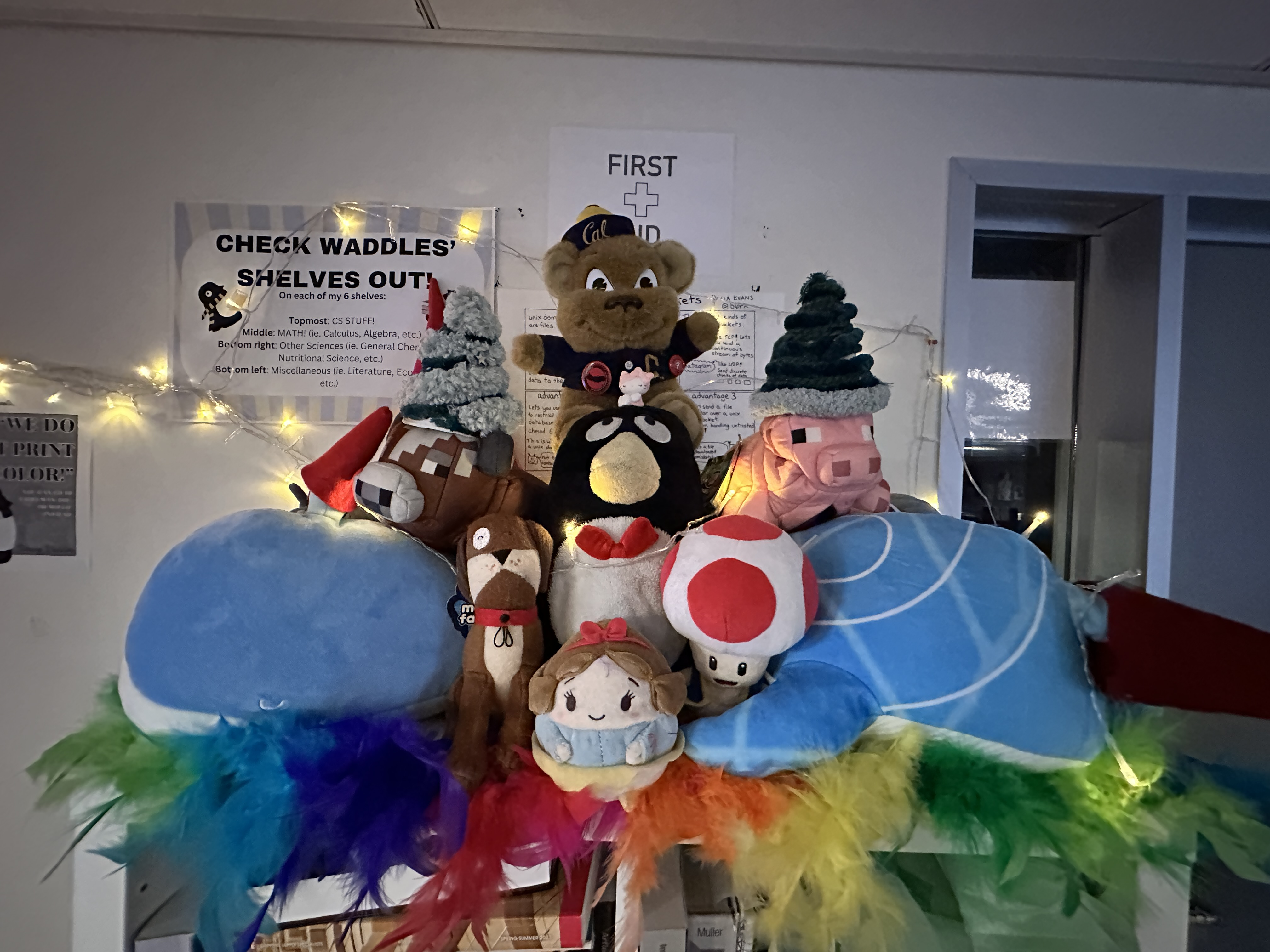 not me shamelessly lurking discord and stealing ronit’s pic
not me shamelessly lurking discord and stealing ronit’s pic
bloopers and extras
from my camera roll
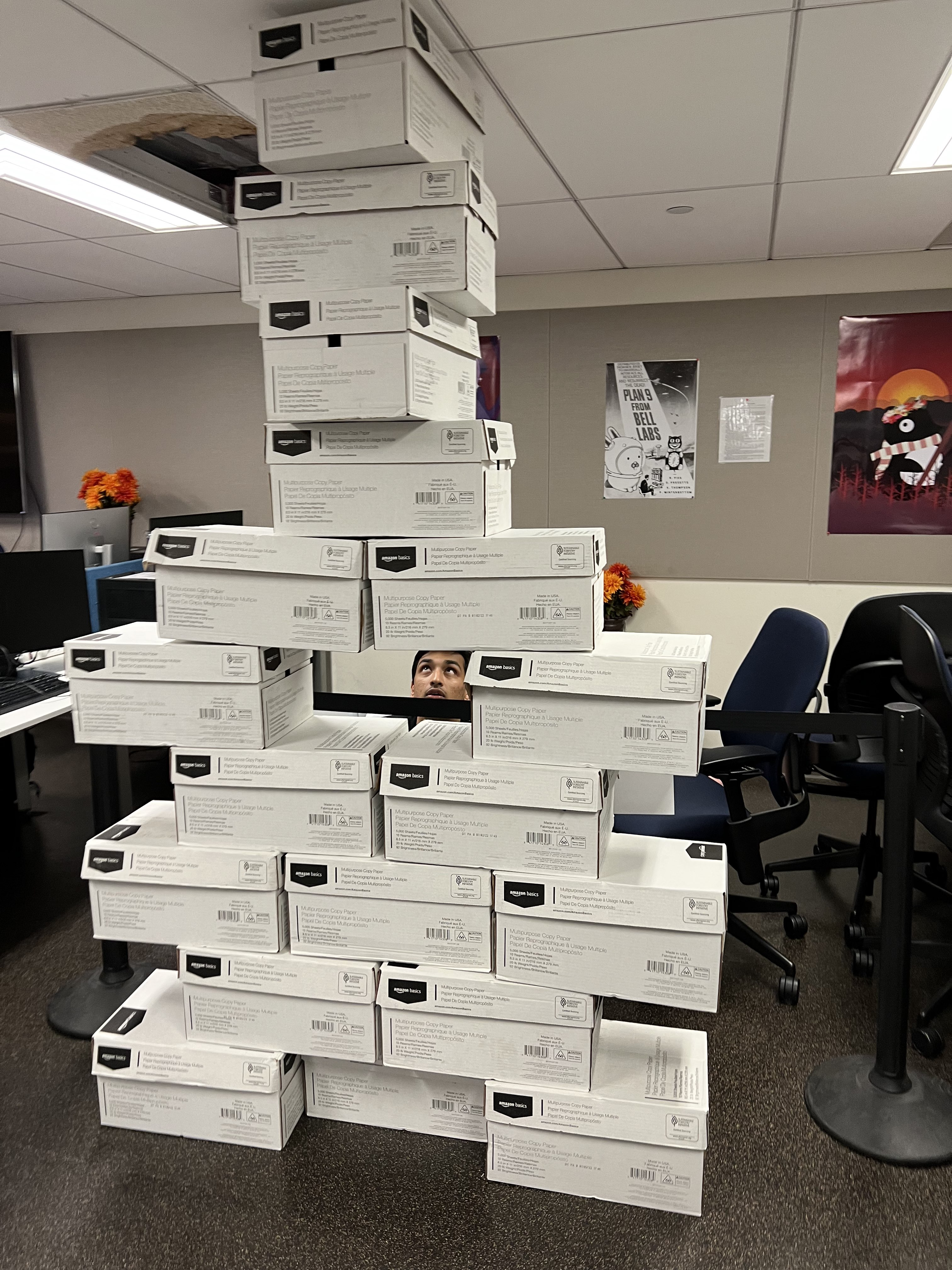 printers at the ocf have gone through 6,366,412 pages in their lifetimes. RIP to the 764-ish trees that sacrificed their lives for our last-minute paper submissions
printers at the ocf have gone through 6,366,412 pages in their lifetimes. RIP to the 764-ish trees that sacrificed their lives for our last-minute paper submissions
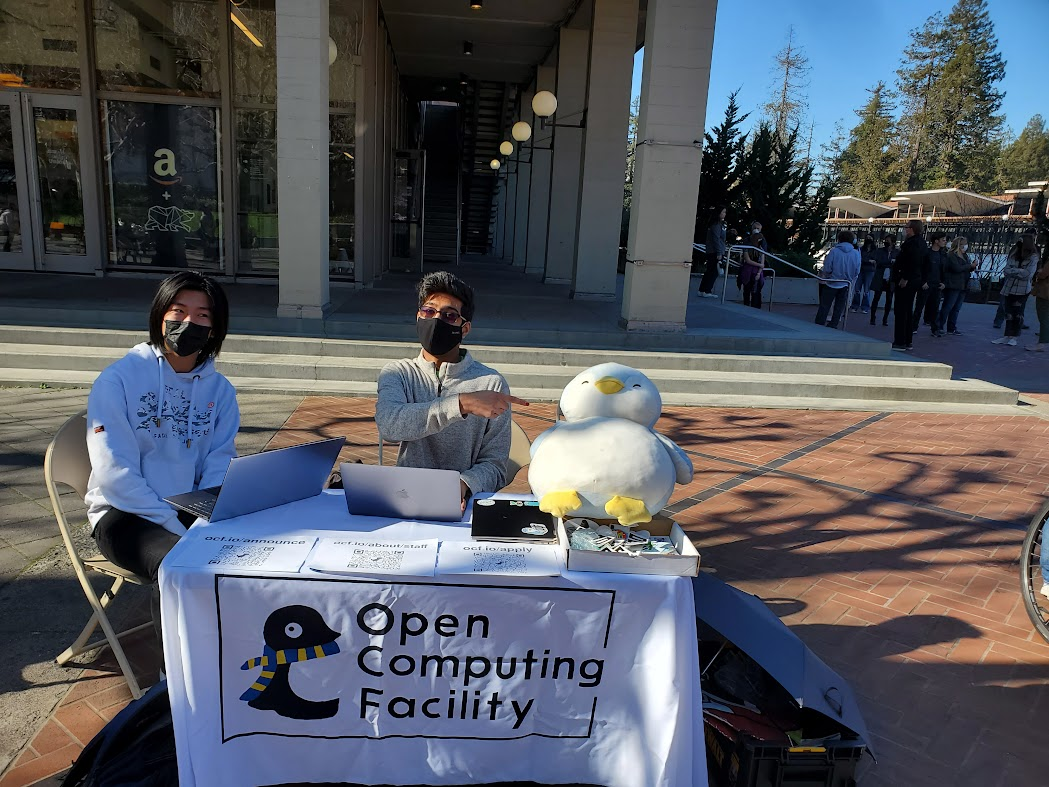 Our mascot Waddles helps with tabling
Our mascot Waddles helps with tabling
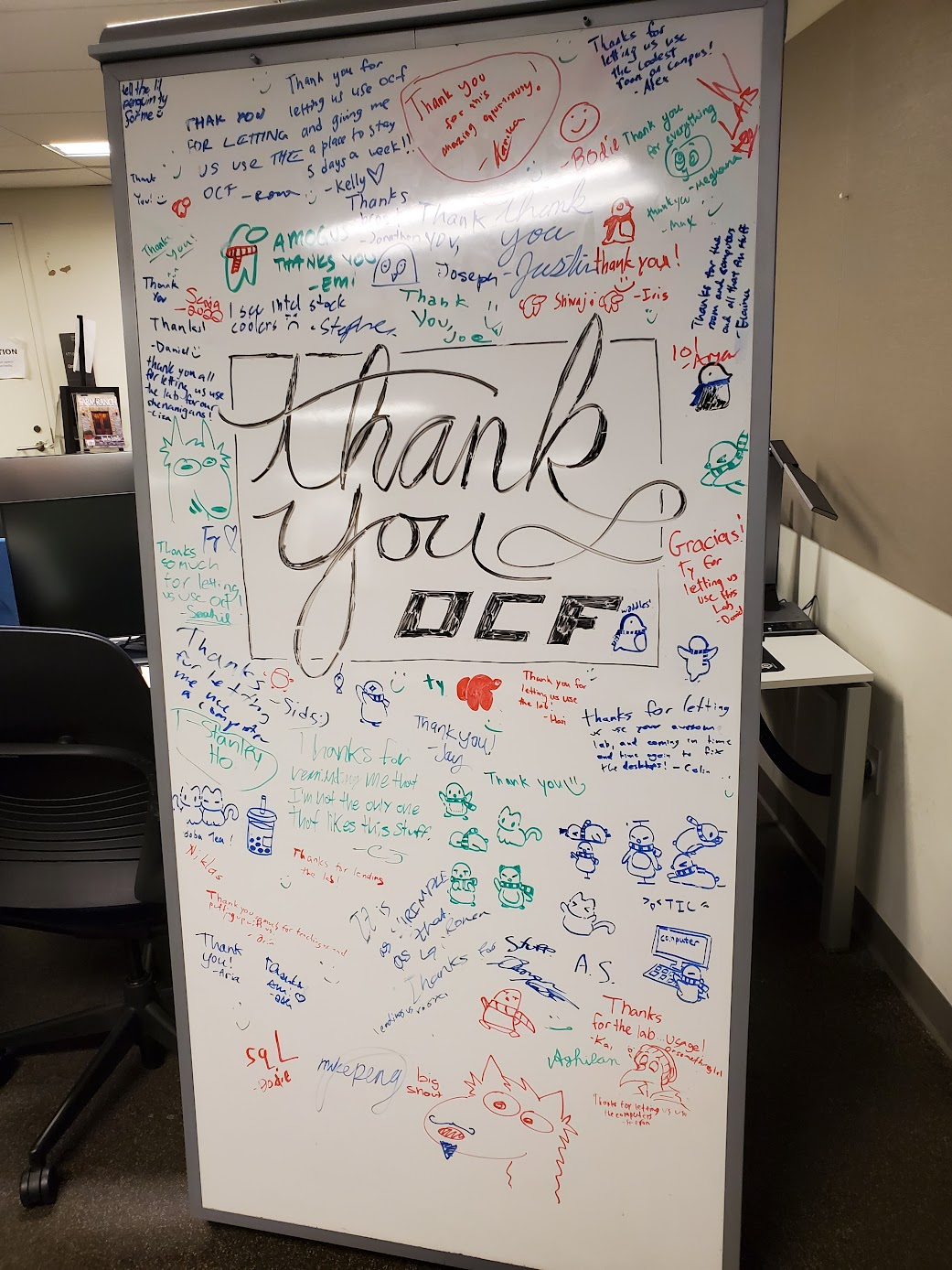 every summer, the OCF hosts a class for ATDP, Berkeley’s advanced high-school summer program. I helped teach one and would highly recommend it (both for students and instructors)! They leave some really heartwarming notes and doodles on our whiteboard each year <3
every summer, the OCF hosts a class for ATDP, Berkeley’s advanced high-school summer program. I helped teach one and would highly recommend it (both for students and instructors)! They leave some really heartwarming notes and doodles on our whiteboard each year <3
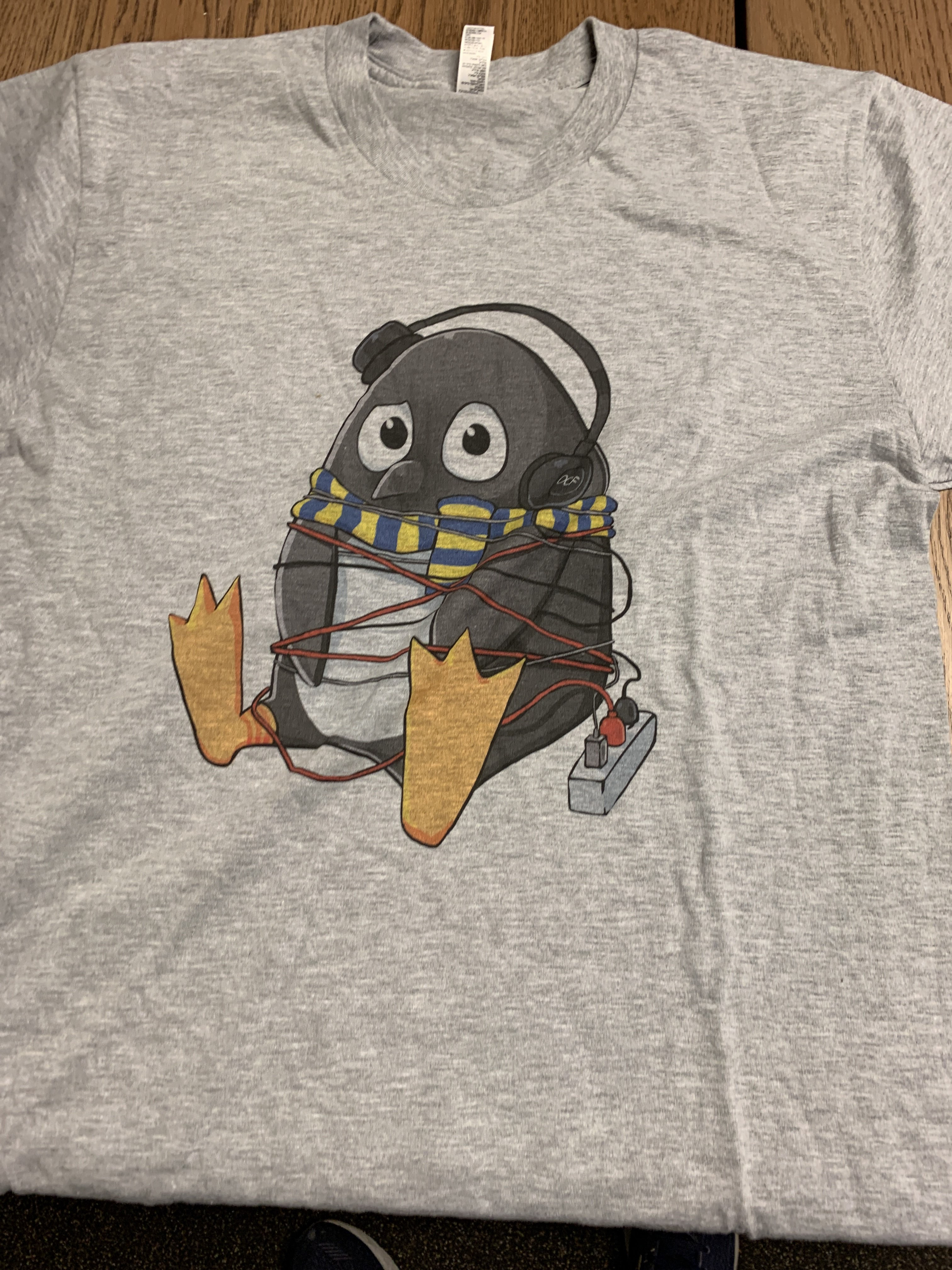 i wish we hadn’t lost the graphics for this t-shirt would love a rerun :’)
i wish we hadn’t lost the graphics for this t-shirt would love a rerun :’)
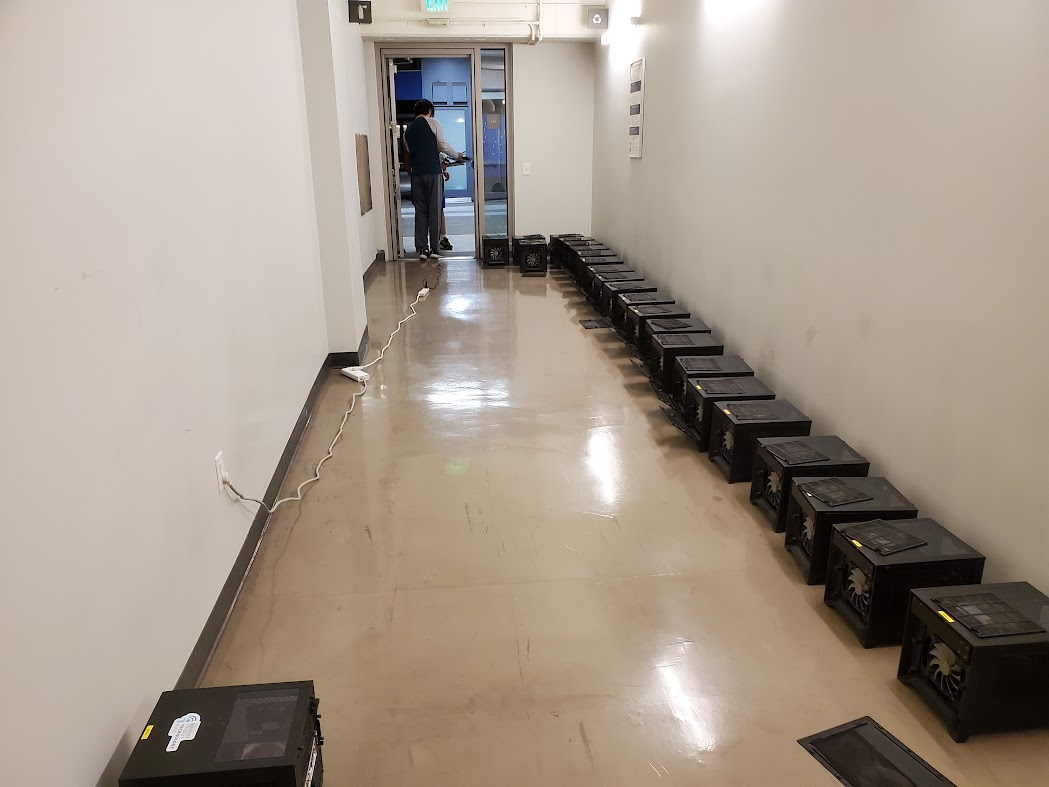 computer cleaning day!
computer cleaning day!
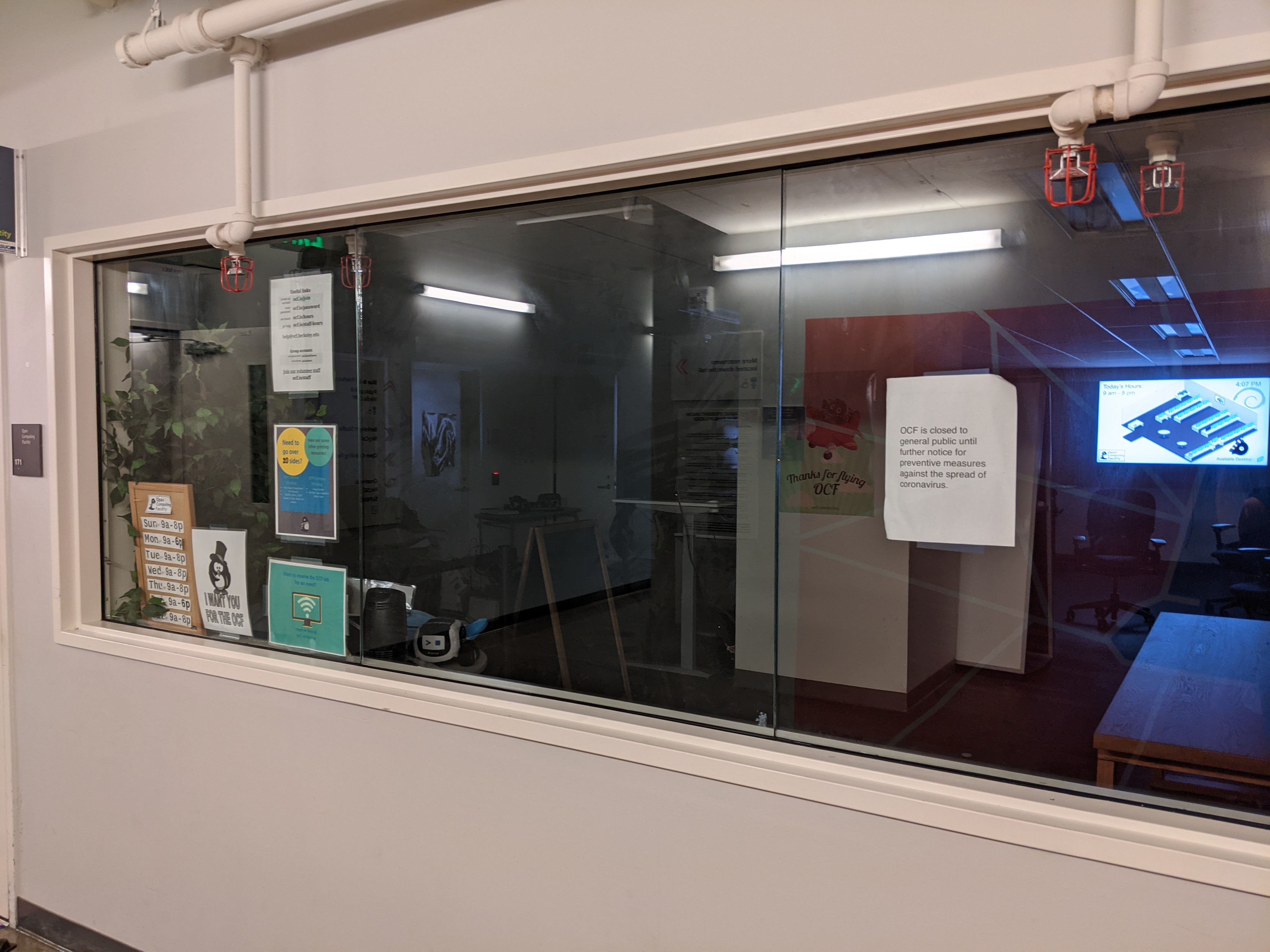 a long-lost covid memory…
a long-lost covid memory…


 blossom
blossom